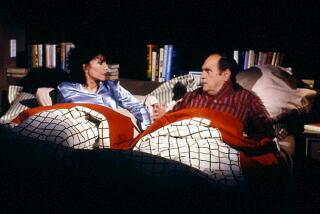‘Larroquette: Less Whine, More Roses : But Series Remains True to Its Black Comic Vision by Using Symbolism to Deal With the Issue of Alcoholism
This is how devoted the makers of “The John Larroquette Show” are to being quirkily literary and sneakily true to their rather black comic vision: When NBC requested that this sitcom about an alcoholic struggling with sobriety dispense with any talk about alcoholism as a condition for renewal, they acquiesced. But they also hired an elephant.
So far this season, without any explanation, the huge mammal has popped up in the background of the majority of the show’s episodes. When one of the characters asked for a sign from God to prevent her from romantically pursuing a priest, she walked outside and found an elephant sitting on her car. In another, mimicking a dance by two lovers in the late-night shadows of a bus station, the elephant kicked up his own heels. And in last Tuesday’s show, the elephant lumbered down the street past a character who was lamenting that nothing notable ever happens in his life.
“We’ve dropped the elephant into little funny places in about 10 episodes this season, and it came from what I think is an AA maxim that living with an alcoholic is like having a 3,000-pound elephant in the living room and no one comments on it,” said Mitchell Hurwitz, the show’s executive producer and day-to-day boss for this, its third year. “When NBC said no more alcoholism, I thought, let’s put an elephant on the show, just have it appear in the background and have no one talk about it.”
The real elephant, metaphorically of course, is Larroquette himself. He is the show’s star, a recovering alcoholic, the “elephant” in the foreground, and such an enormous television star--he played Dan Fielding on “Night Court” for nine years, winning four straight best supporting actor Emmys before he, flat out embarrassed, removed himself from the competition--that the NBC brass just couldn’t cancel him.
In its first season, when the show was truly a sitcom noir, basing its first 12 episodes on the 12 Steps of Alcoholics Anonymous, it aired on Tuesdays against “Roseanne,” and got slaughtered, drawing fewer and fewer viewers each week. In season No. 2, NBC, showing incredible charity, nestled “Larroquette” behind “Frasier,” the network’s Emmy-winning Tuesday night crown jewel. Again it was pummeled, this time by “Grace Under Fire.”
“The audience was telling us they were not buying into it and we got disastrously close to cancellation,” said Warren Littlefield, president of NBC Entertainment. “But we looked at the show and we saw sparks, something wholly original there, and when we matched episodes of the show against new pilots [that could replace it], we said, ‘How can we walk away from this?’ ”
So out with the alcoholism and in with “a more accessible, less dead-end and downbeat” brand of humor and storytelling, and NBC brought the show back last fall with one small hitch. The network exiled the show to Saturday nights, the TV equivalent of the Tower of London and especially hard for an urbane, edgily witty sitcom whose natural audience is not families with popcorn but those most likely out at jazz clubs or art house theaters.
But after watching the first few episodes of the season, before any of them had ever aired, Littlefield said he knew the show was too good to leave there. When another show, “The Pursuit of Happiness” bombed, Littlefield replaced it last month with the show that just won’t die. And in its second week once again following “Frasier,” “Larroquette”--a show accustomed to landing somewhere in the high 70s in the Nielsen ratings each week--came in 14th.
“We’re just stubborn,” Littlefield said. “We have always believed that John Larroquette is a huge TV star, and that fundamentally it was a really good show that just needed some nurturing and some adjustments. Some of the darkness and the downbeat aspect of it needed to be leavened and that meant not to be constantly reminding the audience that he was previously a drunk.”
Larroquette, who used to sell his blood for money to buy booze before quitting in 1981, initially grabbed the part of this “very somber, angst-filled man” because it was the complete antithesis of his wacky “Night Court” character. But he conceded that he and the producers--Don Reo of “Blossom” fame created the show--probably made a mistake in emphasizing the alcoholism so relentlessly right off the bat.
“Personally I was sad to lose the angst, but television is a place to be successful,” Larroquette said. “You have to stay on that balancing beam between integrity and popularity. And as long as one feels that they aren’t completely abdicating the germ of what the show is about, it’s all right to include as many people as possible. And I like being funny. That’s the bottom line. If I want to be constantly reveling in the morbidity of life, I’ll go do Samuel Beckett in some little theater.”
Once the darkness was gleaned from the show, it became more and more a workplace ensemble comedy a la “Cheers.” The bus station where everyone works is its bar. And even the love relationship between Larroquette’s Hemingway and Alison La Placa’s Catherine, who was added in the previous year to lighten the show, has fizzled so that it now more closely resembles the unconsummated romantic struggle of Sam and Diane.
“We don’t want this show to look like anything else, like everything else,” Littlefield said. “That’s not what we asked them to do. It’s now a more likable place for the audience to go each week, but it still is dominated by dark, edgy humor, and we like that.”
*
For example, Hurwitz, 32, plans to do an episode with Daryl Chill Miller’s Dexter--the angry young black man who runs the bus station lunch counter and Larroquette’s most-electrifying comic foil as they trade hard luck stories and battles of race and wills--as a pretend cast member of MTV’s “The Real World.” With the show set in St. Louis, he also plans to somehow get Hemingway and Dexter on a raft going down the Mississippi River, recreating Twain’s Huck and Jim in reverse.
“Originally, Hemingway deliberately wasn’t going to be anything like the funny guy from ‘Night Court,’ but if you come to the show now, and you’re a big fan of that kind of humor, you won’t be disappointed,” Larroquette said. “What we’re doing now is a little more reminiscent of the nut that Dan Fielding was, more physical stuff, more energy in the comedy, less cerebral, without giving up any of the kind of smart, esoteric humor we’ve always done on this show. Maybe what happened was, people who loved my other character and expected it again when they heard I had a new show, tuned in and said, ‘That’s not Dan Fielding.’ But I can live with that. If that means not having a show, then that’s fine. Because that scares the hell out of me as an actor--to think that you are going to wind up like James Tyrone in ‘Long Day’s Journey Into Night,’ going for the money and you’re a miserable son of a bitch at 65.”
* “The John Larroquette Show” airs Tuesdays at 9:30 p.m. on NBC.
More to Read
The complete guide to home viewing
Get Screen Gab for everything about the TV shows and streaming movies everyone’s talking about.
You may occasionally receive promotional content from the Los Angeles Times.






